#bandits of orgosolo
Text
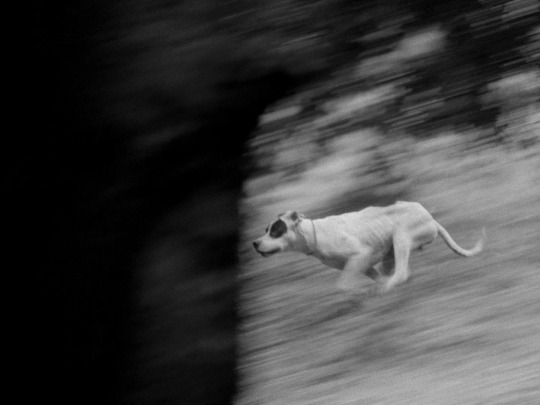
Vittorio De Seta - Bandits of Orgosolo (1961)
84 notes
·
View notes
Text
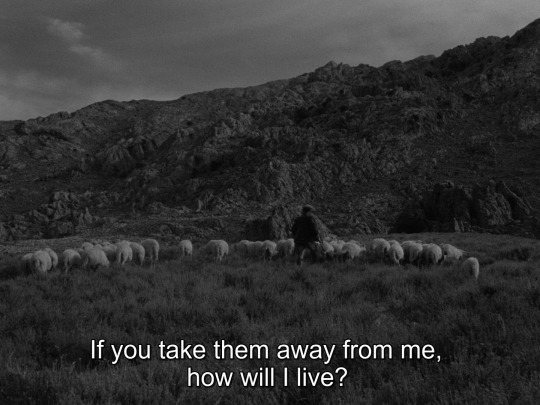
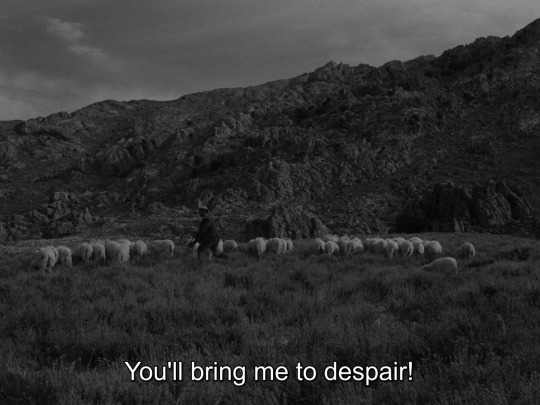
Vittorio De Seta - Bandits of Orgosolo (1961)
26 notes
·
View notes
Text
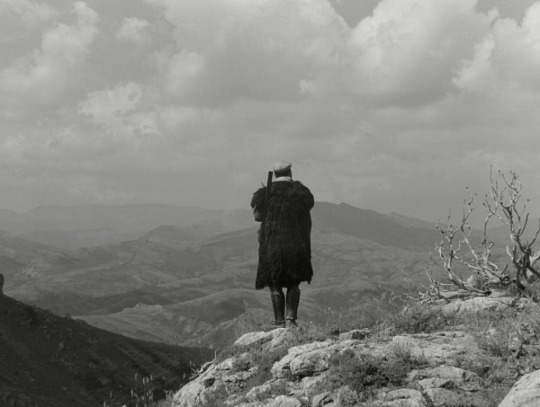
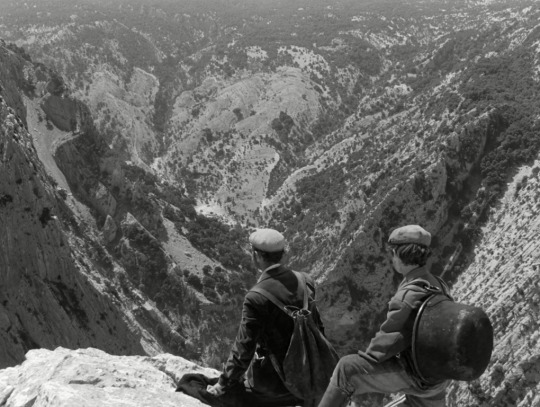
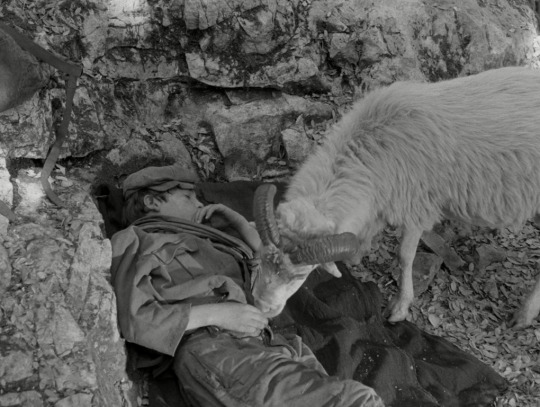
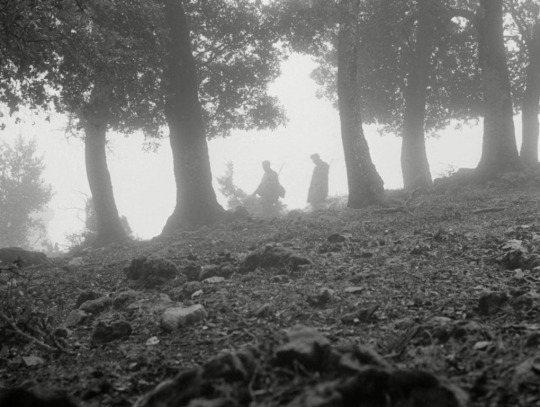
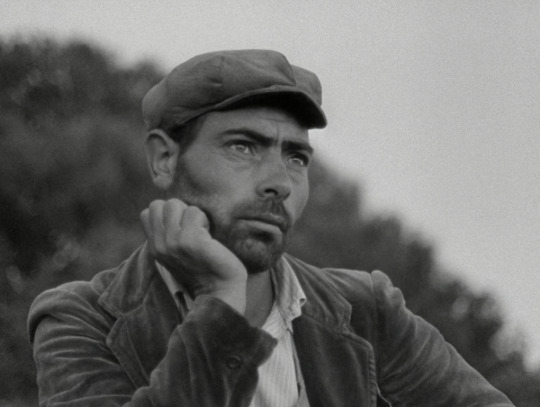
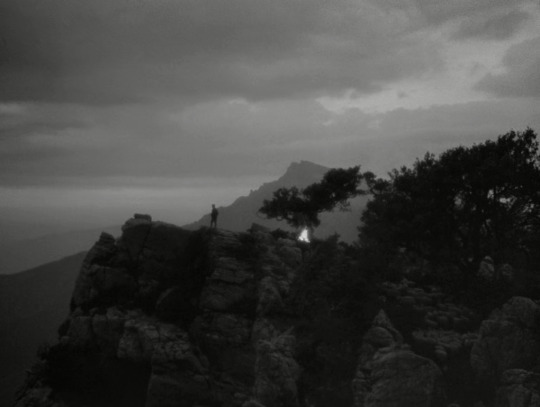
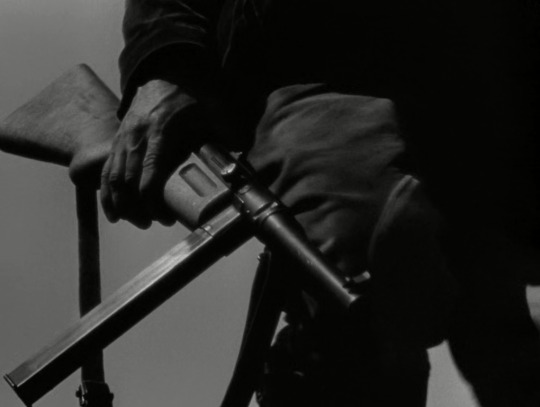
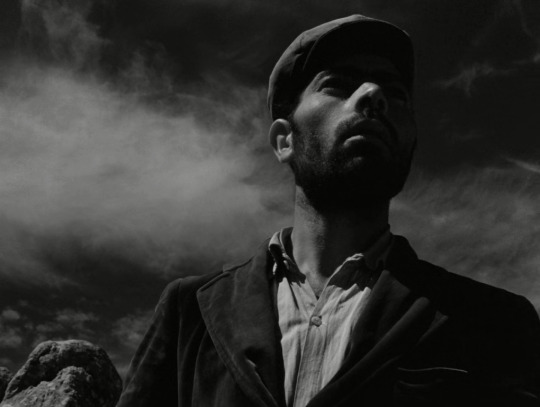
Bandits of Orgosolo (1961)
14 notes
·
View notes
Text
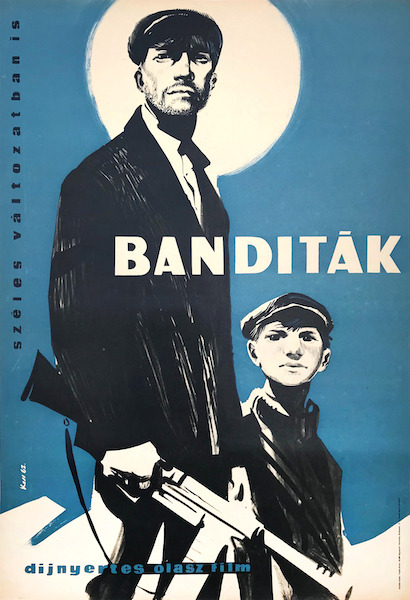
Banditi a Orgosolo / Bandits of Orgosolo (1961) dir. Vittorio de Seta
Hungarian poster by János Kass
1 note
·
View note
Text
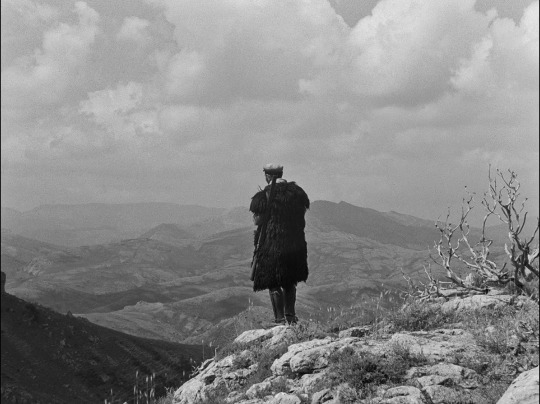
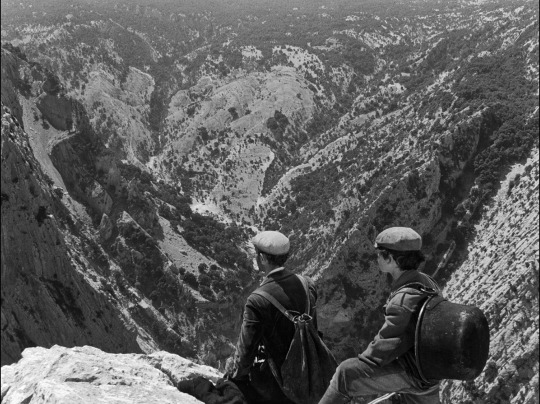
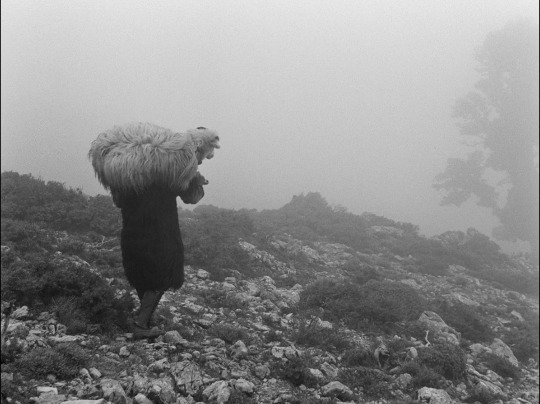
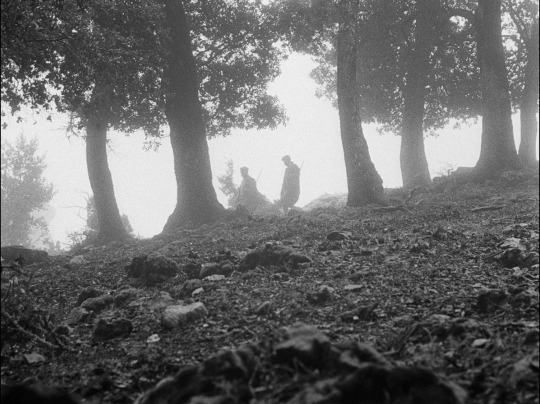
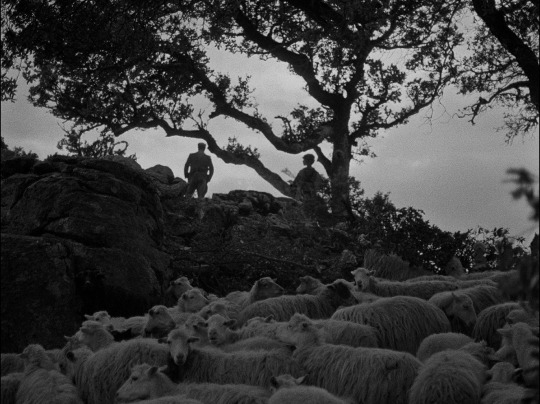
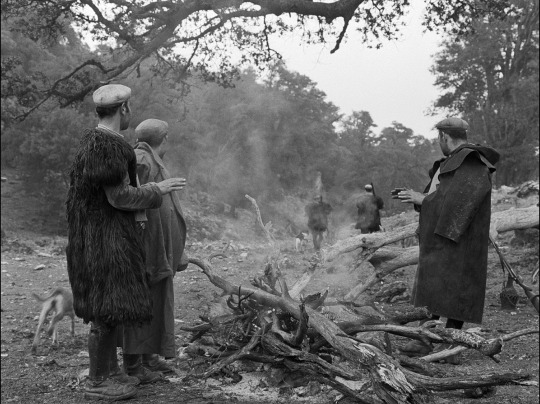

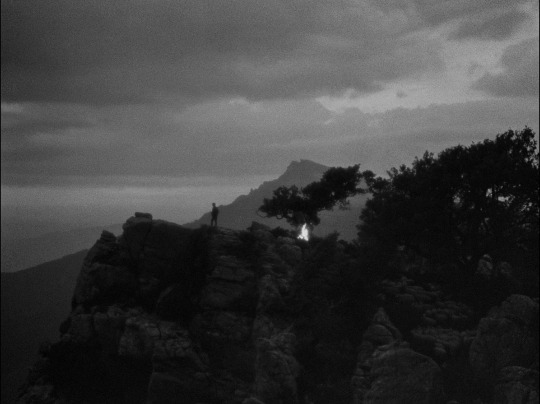
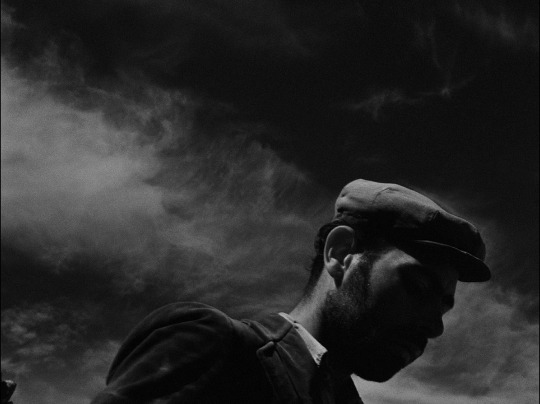
Banditi a Orgosolo, Vittorio De Seta, 1961
1 note
·
View note
Text
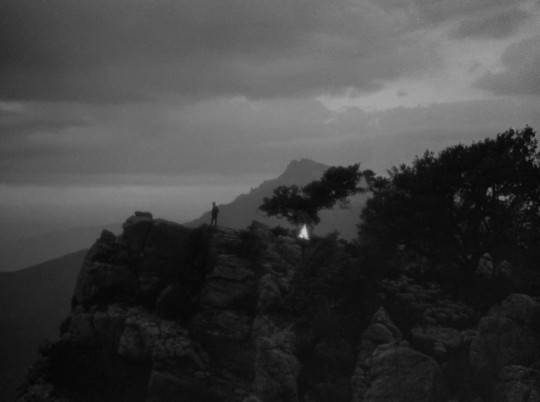
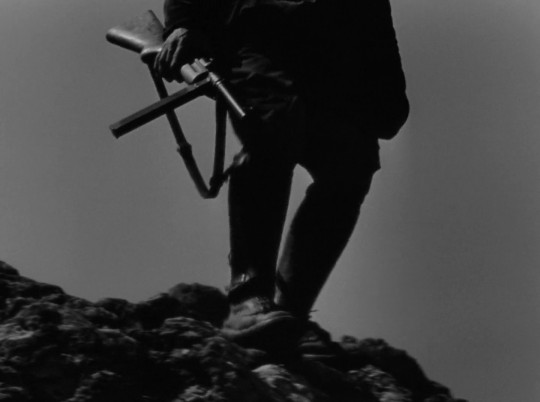
Bandits of Orgosolo (Banditi a Orgosolo) / Vittorio De Seta / 1961
4 notes
·
View notes
Text
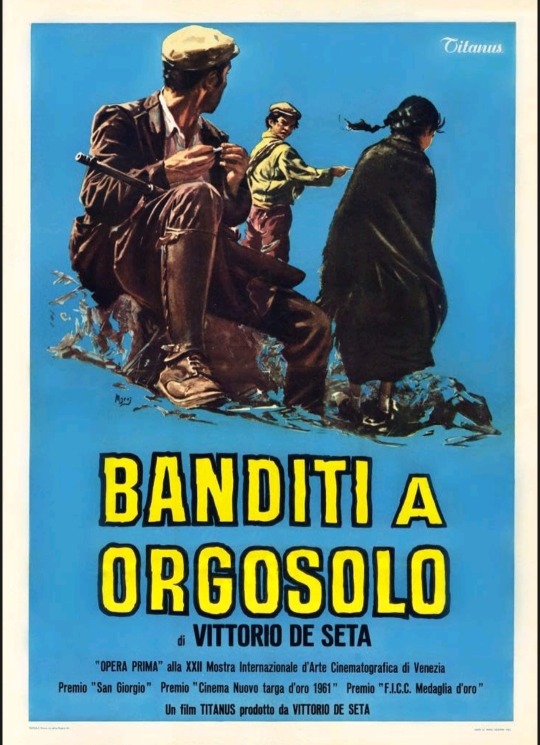
Bandidos de Orgosolo
I, 1961
Vittorio de Seta
8/10
Omertá
Um retrato da miséria e da ignorância, numa Sardenha perdida nas suas tradições milenares de isolamento e desconfiança.
Um pastor vê-se injustamente envolvido numa fuga de bandidos, da qual resultou a morte de um policial. O seu instinto de sobrevivência empurra-o para a fuga. Teme a justiça continental, a perda das suas ovelhas, a prisão que lhe impediria o sustento da velha mãe e do irmão.
Mas é um caminho sem saída. Consegue escapar à polícia, mas não à miséria e à violência, que o empurram para uma vida de foragido, de bandido, condenado e perseguido por todos.
Uma visão dura e impiedosa do isolamento e da ignorância, impostas pela lei do silêncio, nas comunidades pastoris da Sardenha, filmada nas montanhas do centro da ilha, recorrendo apenas a atores amadores, pertencentes às comunidades locais.
Um excelente exemplo do cinema novo da década de sessenta, ao seu melhor nível.
Omerta
A portrait of misery and ignorance, in a Sardinia lost in its ancient traditions of isolation and distrust.
A shepherd finds himself unjustly involved in an escape of bandits, which resulted in the death of a police officer. His survival instinct pushes him to flee. He fears continental justice, the loss of his sheep, the prison that would prevent him from supporting his old mother and brother.
But it's a dead end. He manages to escape the police, but not the poverty and violence, which push him into a life as a fugitive, a criminal, condemned and persecuted by everyone.
A harsh and merciless vision of the isolation and ignorance, imposed by the law of silence, in the pastoral communities of Sardinia, filmed in the mountains in the center of the island, using only amateur actors, belonging to the local communities.
An excellent example of new cinema from the 1960s, at its best.
0 notes
Text
Assistir Filme Bandits of Orgosolo Online fácil
Assistir Filme Bandits of Orgosolo Online Fácil é só aqui: https://filmesonlinefacil.com/filme/bandits-of-orgosolo/
Bandits of Orgosolo - Filmes Online Fácil
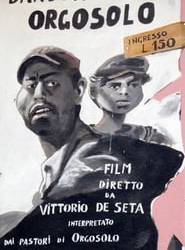
Um camponês da Sardenha está implicado no assassinato de um policial e, embora inocente, ele não se entrega, sem fé no sistema judicial e temendo que ele possa perder sua ovelha enquanto aguarda julgamento. Ele sai para as montanhas com seu irmão, mas a vida é difícil e seu rebanho morre. Voltando para a cidade que ele descobre sua família em uma pobreza abjeta. Ele adquire uma arma e, forçada por sua situação social, resorts a banditry.
0 notes
Text
Days 7-9 – Thursday-Saturday, 1-3 June
Thursday
Winter in Australia, but not yet Summer here. They mark the seasons by the Solstices and Equinoxes so there are still three weeks before Summer starts here.
We all piled into the coach after breakfast (we were lucky to get the front seat with great panoramic views but we have agreed to share the two front seats around) and set off for a short ride to Sorgente Su Gologone – a mountain spring that delivers under ten litres of water per second in drought conditions, a few hundred litres per second normally and over eight thousand litres per second after heavy rain. It is then a massive (terrifying) torrent roaring down the riverbed, but it was much more normal for our visit. The pool where the spring erupts is of unknown depth. It is known to be more than 135 metres deep, but nobody has ever reached the bottom.
It had rained overnight and it was a lovely one- or two-kilometre walk to the spring and back, with everything cool and damp, lots of pretty flowers along the path, a few birds singing, and the bubbling brook making the whole scene quite idyllic.
Back in the bus, we drove to a lookout on the edge of a town whose name I can’t remember. Most people went for coffee in town – we often have to stop to quench people’s passion for caffeine (and the pressure in their bladders) – but on this occasion, Heather and I stayed near the bus while others did their own things. Heather read and I looked for birds in the beautiful wooded valley below the carpark. It was a lovely quiet hour or so, except for the traffic noise a hundred metres away.
Next stop was Orgosolo, a town that was famous as a former hotspot for the kidnapping and bandit trade, now a quiet and peaceful small town. For very good reasons, it was previously known as the ‘City of Murderers’! It is now more famous for its murals. There are hundreds of them (maybe thousands) on the walls of almost every second building. They commemorate all sorts of political and social events, as well as incidents of note around the world. There are hundreds of them, some highlighting features of the shops on whose walls they are painted, but for all sorts of other things – Nine-Eleven, Saddam Hussain’s overthrow, a serious train wreck – dozens of recognisable events but many more that didn’t mean much to me, but are obviously important to other people, so another wall gets decorated. We had a guide who explained many of them to us and then we were left for an hour or so to find some lunch and make our way back to the coach. We had a very enjoyable cheap lunch with beer and wine, but some others ate more lavishly in a variety of restaurants.
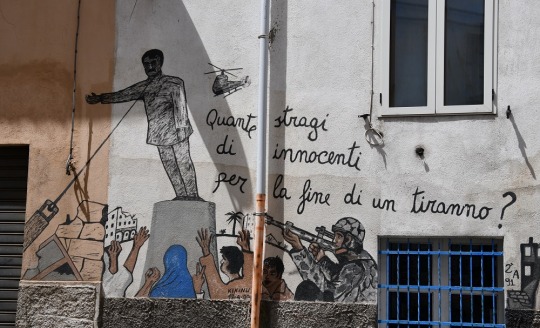
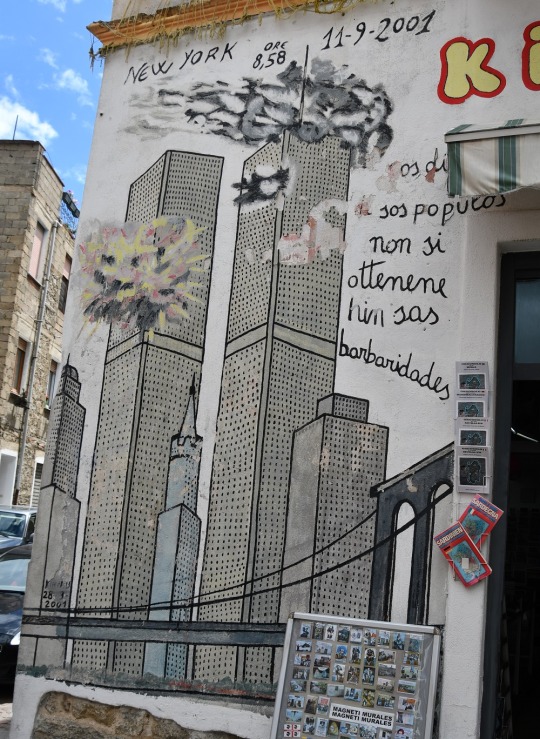
On the drive back to the hotel, we passed dozens of abandoned buildings. Most looked like old stone houses, almost overgrown with brambled, vines, fig trees and so on. They were perhaps hundreds of years old, maybe it is hundreds of years since they were people’s homes, but there were certainly a lot of them spaced out along the road, but mostly in the trees well away from the road.
Another thing that was highlighted on our walk down the main street looking at the murals was the traffic. The streets are often very narrow and cars are parked quite literally anywhere and everywhere, at whatever angle they can fit, whether that means other vehicles are parked in or not. They are cobbled laneways more than anything, but the traffic treats them as autobahns. Everyone speeds, and doing 70 or 80 down these pokey lanes, crowded with tourists, seems to be a pretty foolhardy sport – and it is up to the tourists to hide behind the parked cars until another volley of cars, trucks and motorbikes roars past. Stop signs are also interesting. There are plenty of them and the speed limit is usually 50 kph or less where they are positioned. What that means for the drivers confronted by these offensive signs, is that they must slow to about 80 kph in uncooperative case cars are approaching in their path. We have seen numerous near misses, but few vehicles seem to have much evident damage. There are plenty of old vehicles that are falling apart, but surprisingly few with obvious crash damage. (A few days later, we watched a small car backing into a smaller bay and crunching into the car behind, then in front, trying to move them further back or forward - or to dent them or his own car enough to fit into the bay - it is just like Paris!)
Friday
Today we drove across Sardinia from east to west. Unfortunately, our tour leader doesn’t understand these words. He has trouble with north and south, but east and west have completely beaten him and he confuses them repeatedly – sometimes two or three times in the same sentence. Everyone on the bus let it ride for the first dozen or so times, but then started correcting him, even shouting at him when he insisted that it was one or the other when it was not. He really does have some problems.
It was a wonderful country drive. We stopped for coffee in Nuoro, the provincial capital and a pleasant historical place with interesting buildings and gardens. From there, we passed many nuraghes, some cork plantations, ruins of old houses and fortifications, great rocky mountainsides, forests and green fields, a few crops, but mainly natural scrub. The mountains look impressive, huge slabs of limestone or basalt, but our leader told us that they are all less than a thousand metres high.
It was very scenic and colourful and we eventually approached the coast a little south of Bosa. We caught our first glimpse of the Mediterranean (if you don’t count the Cagliari harbour) as we started to descend toward the coast and our driver surprised our leader by pulling into a few viewing points so we could take photos. Unfortunately, none of the viewing spots provided much of a view. I think our leader said that it is now illegal to stop on any of the highways, but the views are uniformly better on the highways than in the designated viewing turnouts.
We arrived in Bosa a couple of kilometres from the coast on a navigable river, with lots of fishing boats along one side. We walked as a group along the river concourse to the far end of town, then cut in and walked back to the central square along a cobbled pedestrian way, with lots of boutique shops on both sides. We were then let loose to buy our lunch and we enjoyed a very leisurely light lunch with a cold beer. We were joined by one of the other women on the tour and sat chatting for an hour or so before heading back to the bus. There were a few ducks on the river so I photographed them, but am still trying to identify them. (My Sardinian list comprises 27 species at present and that will probably be the total. We are off to Corsica in a day or two and all the birds we are seeing are the ones we have been seeing for several days. There are a few dominant species – Rock Doves and feral Pigeons (millions of them), Yellow-legged Gulls near the sea, Common Swifts, Hooded Crows, Eurasian Collared Doves and Common House-Martins being overwhelmingly most prevalent – probably in that order.) (Days later. After reviewing my photos, my Sardinian list topped out at thirty species.)
From Bosa, it was quite a short drive to Alghero where our Hotel is situated a hundred metres or so from the harbour. Once settled in, I had a quick walk to the harbour and back but we spent most of the afternoon in our room.
We had drinks in the bar atop the hotel and then we had a ten-minute walk to the restaurant for dinner. Our leader told us that in Sardinia, if you ask anyone how far it is to the corner store (or the town on the other side of the island), it is always ‘Ten minutes’. I said that simply depended on how fast you are walking/driving/flying but he assured us that this one really was ten minutes. Unfortunately, he didn’t know where it was so after fifteen minutes, he asked a different restaurant how to get there – and it was just another ten minutes! Fifteen minutes later, it was just around ten corners, a mere ten minutes – and lo and behold, it was only a little over an hour when our driver found the place.
It was a seafood dinner, but a strange mix of shellfish, pasta and a tiny parcel that was described as a fish patty. I was hungry and ate it all, but it was a very ordinary meal. I had to sneak outside again due to the unbearable noise and was accosted by an Irish couple who wanted to know what the meal was like. They visit Alghero every year and always ate at that restaurant – the best in town, they said – but they hadn’t eaten there since it changed hands a couple of years ago. It was booked out anyway so they had to look for another place, but I had a great chat with them – really lovely people – and when Heather came out, there were hugs all round like we were close cousins who had just met up again.
Then it was ten minutes straight down the hill to our hotel – via a most circuitous route that took in the old city and the full length of the harbour – about twice as far as it was getting there. Our leader assured us that it was a lovely short stroll. Please can I have my bed now?
Saturday
More confusion this morning. None of this is serious – in fact we are all treating it as a bit of a joke – but the times to meet and the locations vary from hour to hour. They changed a couple of times between last night’s drinks, after dinner and brekky this morning, but we were all set to go by boat to a famous grotto forty minutes (oops 75) offshore (just ten minutes away). We all arrived to walk down to the boat (there must be a hundred million euros worth of boats in the harbour – maybe ten times that) at 9.30. Off we went and when we arrived, there was a change of plan – meet again at 10.30, with actual departure being 10.45. It is a lovely day so our leader thought we could go for a walk until we were allowed to board – but that would not be before 10.30. A few went walking, but most occupied some nearby seats until we saw other people, not from our tour, walking onto the boat and snaring all the best seats. So we went over and were welcomed aboard twenty minutes before we were told we could. Chaos seems to be the natural order of things – all minor, but if something was important, we could be in serious trouble.
We arrived at the headland where the grotto was located but there was another boat disgorging its horde of passengers so we went for a mini-cruise to another group of rocks until they were done. It was a strange way to do it but we joined a few hundred other people waiting to go into the grotto with nobody seeming to know what was happening. It seems that tour groups were given priority over the poor plebs that had made it on their own and we were pushed in ahead of a lot of others. Heather and two other women decided not to risk the journey - wise ladies. The grotto is a mammoth cave with huge stalagmites and stalactites and giant caverns with a few inches of water in most of them. It is not much different from many of the other ones I have seen, but it is perhaps the biggest I have been in. There is a very long narrow walkway through the caverns, often winding through clusters of columns with everyone (particularly the French) pushing and shoving to try to get ahead of whoever is in front of them. At the far end, there is a loop and everyone then starts heading back to the entrance with hundreds of people still pushing their way in. It was all pretty disorganised, perhaps because there were so many people all trying to get in and out against the flow, but we all got out in due course and were soon back on our boat and heading back to shore. It was interesting enough, but the piped commentary in at least three languages was echoing around and impossible to hear. The commentary-maker had a strange singsong voice, almost Asian to my ear, and English was very obviously not her first language – and of course, the acoustics were terrible.
Back on shore, we headed back to our hotel and stopped for lunch at a small outdoor place just across the road from here. We just had sandwiches and drinks with a little pastry to go with our coffee and spent the afternoon in our room, mainly writing up this blog.
This evening, we wandered down to the harbour and selected an outdoor restaurant for dinner and were joined by another couple from our group who had just walked out of another restaurant due to them being ignored for ages while other people were being served. We had a great meal with them and I had a mixed grill – very different from one at home, basically a selection of meats, plus a couple of varieties of lettuce. One of the delicacies was horse meat – as tender as you can imagine and quite delicious.
1 note
·
View note
Photo
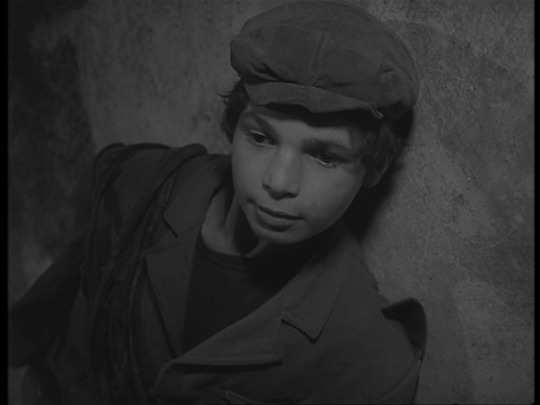
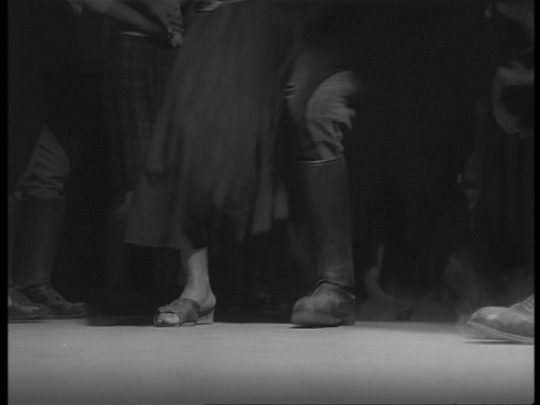
Bandits of Orgosolo (Banditi a Orgosolo) 1961, dir. Vittorio De Seta
12 notes
·
View notes
Photo
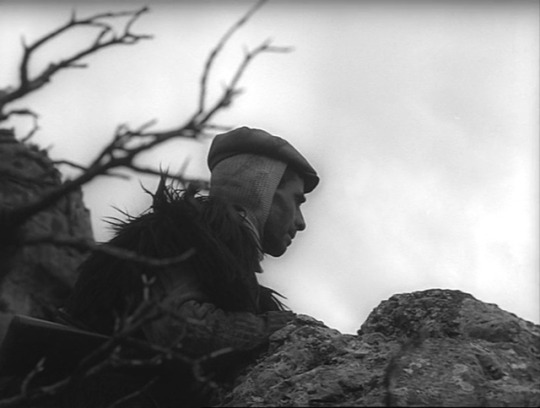
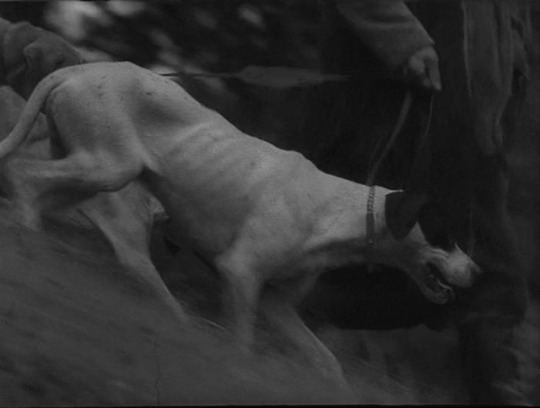
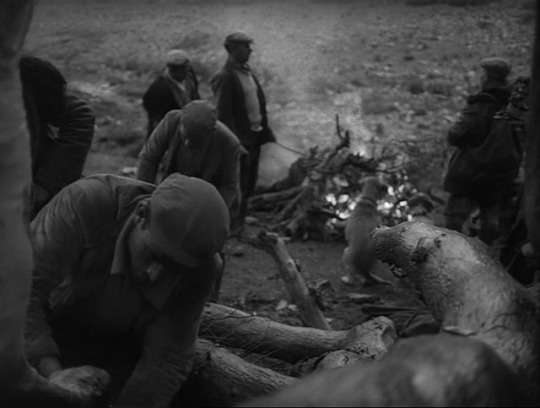
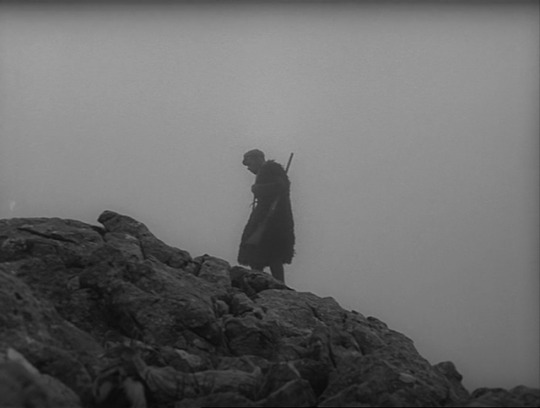
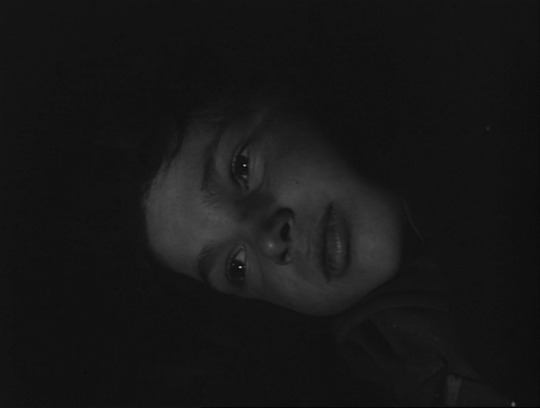
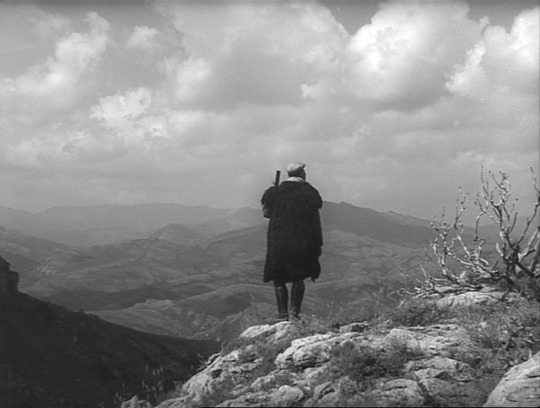
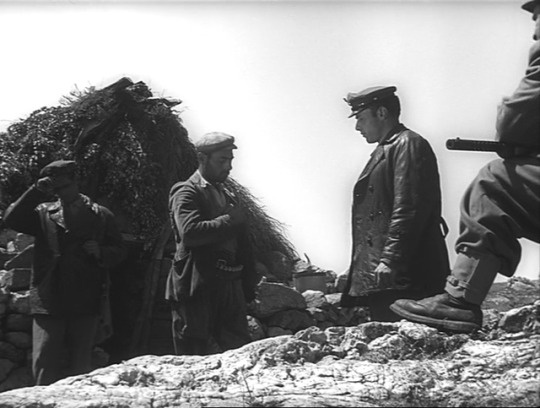
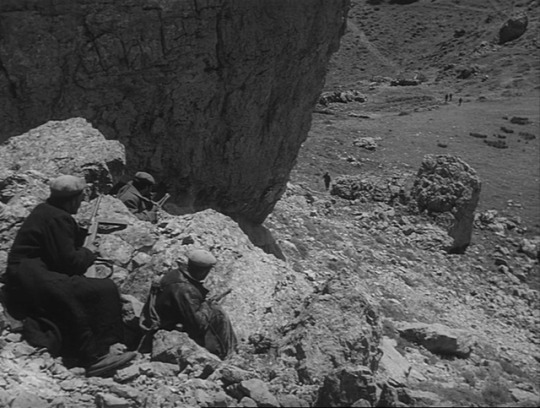
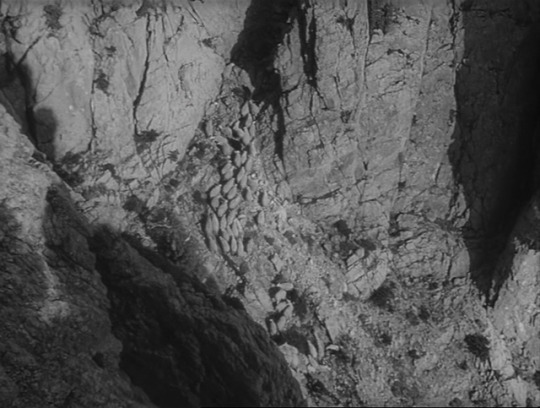
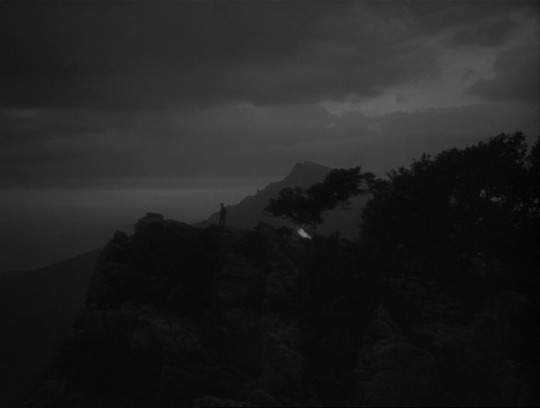
Bandits of Orgosolo (Vittorio De Seta, 1961)
7 notes
·
View notes
Text
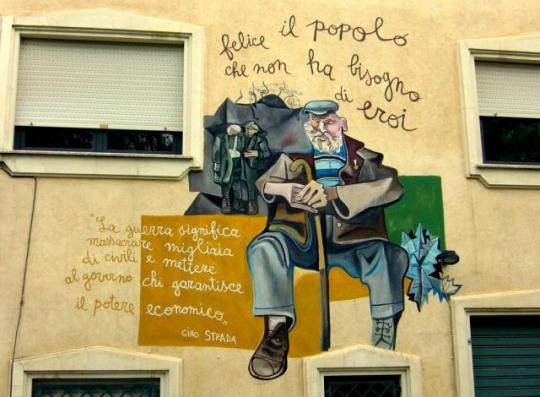
IT/DE/ENG
This is a mural in Orgosolo, Sardinia (IT). It's a really beautiful, quiet town with so many amazing art pieces throughout! If you ever get the chance, I really recommend a visit (Also, there's bandits.)
"Felice il Popolo che non ha bisogno di eroi"
...is a quote out of a play called "Leben des Galilei" (The Life of Galilei) written by german poet and playwright Berthold Brecht in 1939. We follow the famed Galileo Galilei throughout his life, observe his groundbreaking discoveries that prove the earth revolves around the sun, and how he ultimatelz gives in to the pressures of the church to denounce this model and ends up disillusioned, disappointed in himself and blind.
Anyways. I don't think the quote needs any context as such, but the preceding line of dialouge adds to it, in my opinion:
-Unglücklich das Land, das keine Helden hat!
-Unglücklich das Land, das Helden nötig hat.
~ Bertold Brecht, Leben des Galilei (1939)
-Unfortunate the land that has no heroes!/...the people that have no heroes!
-Unfortunate the land that has a need for heroes./...the people that have a need for heroes.
(More in-depth context for whoever cares: The conversation happens between Galilei and his student, Andrea Sarti, after Galilei has publicly given into the demands of the inquisition and denounced his heliocentric model. Sarti is very disappointed in his mentor because he expected Galilei to stand up for what he knew was scientifically correct - he was supposed to play his part of the stoic hero who stands for honesty but he didn't.)
Now, longer synopsis/analysis/even MORE context below the cut because I wanna see what I can still remember from school 😅 (and what a Wikipedia-sprint-readthrough can get me) This is not proofread, might not be coherent, mainly for myself... read at your own risk.
Right, first things first. Historical context and reality. In the late 1500s we have two relevant models in regards to Galilei.
the geocentric model by Ptolemeus which takes into account a lot of astronomical observations such as differences in planetary orbit etc, but places the earth in the center of it all. This results in very...let's call them interesting orbits the planets would have to follow in order for it all to work out
the heliocentric model by Copernicus that was first described in 1543, he still incorporated the 'godly harmony' that was a hit since Aristotle, which means everything moves in perfect circles, the sun is immaculate, such things. Later Kepler came up with ellipses as the most likely planetary movement (Kepler and Galilei were active in the same timeperiod, 1571-1630 and 1564-1641) In this model there should also be an outer sphere with the stationary stars that would be called into question by Galilei (amongst others) shortly before he completely lost his eyesight because there was an observable supernova out there...
There was also a third one by another contemporary, Tycho Brahe that was a mishmash of those two - earth around the sun but planets around the earth or no self rotation of the earth, I don't know...also, flat-earth-theory was widely accepted as disproven, even in the church.
So. What did Galilei do?
He was very taken by a new invention, the telescope and improved upon it. With this cool thing he now made discoveries like moons of Saturn, the surface of Venus, the fact that the sun was not a glowing ball of perfect, but that there were spots on its surface...a lot of stuff that was more or less accepted (even by high standing members of the church) BUT he was convinced of the heliocentric model and all of his discoveries were in alignment with that, and there was an already ongoing debate within the church about which worldview/-model to adapt. Copernicus' model was to be viewed as merely that - a mathematical model for simplicity that did not necessarily reflect reality (admittedly not THAT absurd of a notion once you have to sit through a few lectures on physics...). The famous denouncement Galilei was forced to make was funnily enough over a text he wrote with funding an encouragement from the pope. The POPE. Who asked him to compare and contrast the geocentric and the heliocentric models. Wikipedia tells me that he made the crucial mistake to ridicule a theory posed by said pope (all contradictions do not have to be solved because God can just intervene and make it not make sense...) and to explicitly state his favouritism of Copernicus' model (through the mouth of an Idiot character, but still, once you piss off the pope, that's not gonna fly...). He had also written this text, called 'Discorsi' (discourses) in the popular Italian instead of the scientific Latin, which would have made it accessible to all the literate people, not just those woth a higher education. (This is important for the play)
There's this popular myth that after Galilei denounced his text and was free to go, he muttered to himself while leaving "Eppur' si muove" (It f***ing moves. Freely translated...) which I would like to accept as historical fact simply for the badassery of the quote, thank you....
Now, what about Brecht's Galilei?
Throughout the text there are instances where it is made clear that members, if not the majority of the church are well aware that the heliocentric model of the universe makes a lot of sense, but they fear what a non-earth and thus non-human-centric worldview might imply for the tried and tested narrative of humans as God's favored creation. Subtextually and for us as viewers 200+ years in the future, it is clear that the clerics and the 'God appointed' nobility fear for their power.
However, there is a fascinating dialouge with Galilei and a cleric that contrasts viewpoints on scientific discovery.
Later Galilei will explain that there are two types of scientists: those who want to improve life and labour for humans and those who simply want to collect knowledge for knowledge's sake. This dialouge takes place before his denouncement and while the cleric is a stand-in for the church and Co., his character is also a mathematician and a physicist. He understands Galilei's points and even agrees with him from from scientific standpoint. But where their opinions differ is when it comes to the consequences that such a shift in worldview might do to the simple people.
It brings up the reality that people at the time had neither the time nor the resources to follow the astronomical debate and such a shift in worldview, if acknowledged by the church, might call everything they believe in into question. What would give the people strength to keep going in a life as miserable as theirs with no end goal in sight that they are working towards, once they see themselves as merely a few billion microscopic flecks on a small planet of many in a Universe that doesn't care about them or the earth... while Galilei is convinced that with this the people would finally have the means to outgrow/overthrow the 'god-given' status quo and get out of their oppression, the cleric predicts a deep depression.
Throughout the course of the play, it is never revealed who would have been right, because by denouncing his work, Galilei takes that opportunity away from the people. Once blind and at the very end of his life, he monolouges about what responsibility he had to stand up for what he knew or at least believed to be true. He hates himself for the betrayal of what he sees to be the only science worthwhile: science for the bettering of humanity. However, even though he is at some point presented with an opportunity to publish his work, he again decides against it, and with that reinforces his decision once again.
In a rewrite in 1945, after Hieroshima and Nagasaki (the author lived in America by that point, and was confronted with the aftermath of that), Brecht lets Galilei end on the - very depressing - notion that with his denouncement he threw away what could have been a step towards a science in the name of and for the people that will now have its consequnces as an inherited generational sin that inevitably culminates in the creation of such devastating weaponry...
#quoteoftheday#literature#galileo galilei#leben des galilei#don't click on 'read more' unless you're willing to sit through a probably not very coherent wild ride#sardinia#murales#orgosolo#i should be sleeping#history?#i am sorry#unglücklich das land das helden nötig hat#sardegna#IT#ENG#DE#i did a thing
17 notes
·
View notes
Text
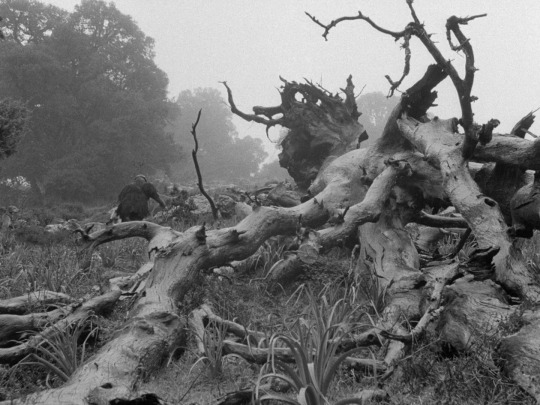
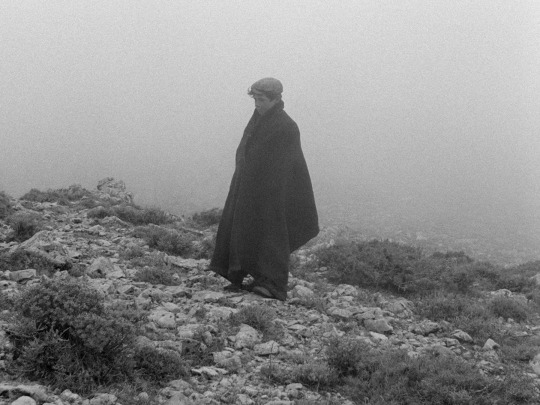
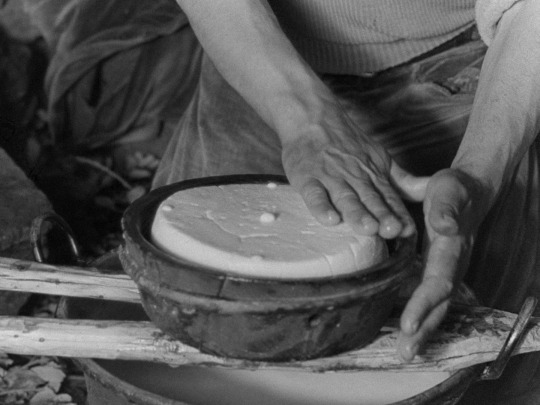
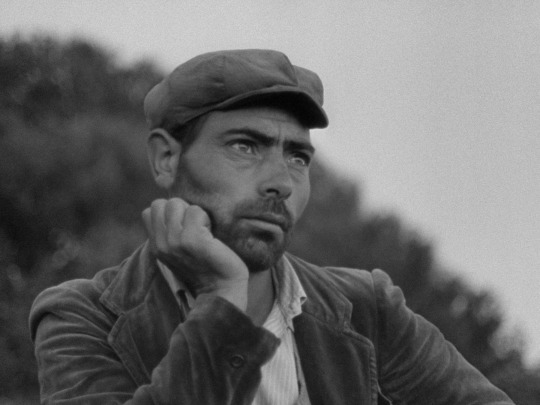
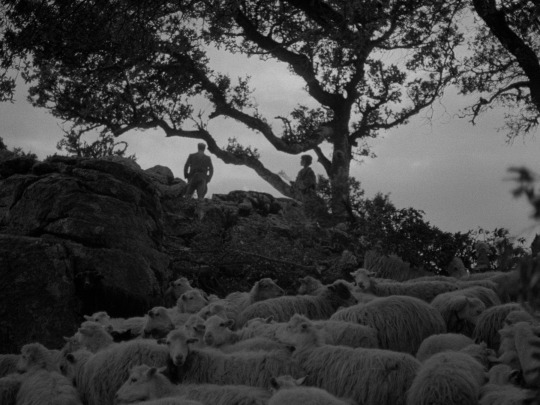
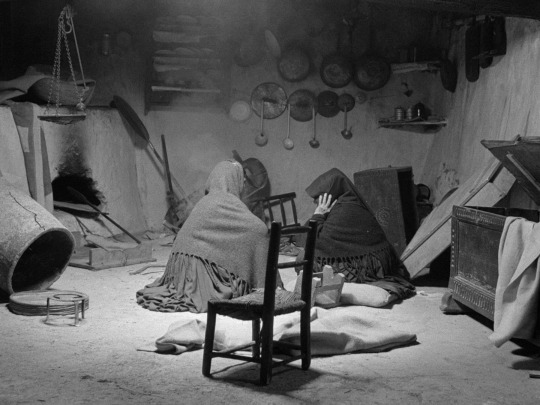
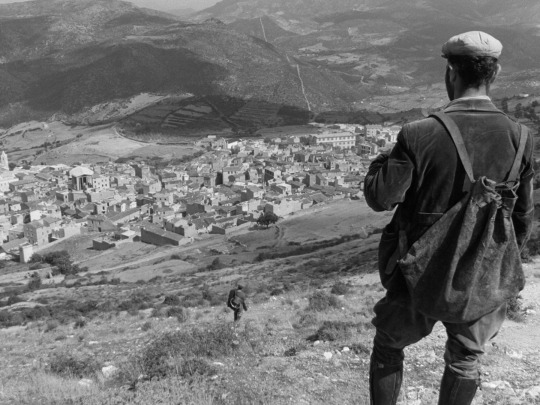
Vittorio De Seta - Bandits of Orgosolo (1961)
19 notes
·
View notes
Text
Headlines
U.S. election officials warn of November chaos due to budget crunch
(Reuters) A Michigan town wants machines to speed up counting of absentee ballots. In Ohio, officials want to equip polling places so voters and poll workers feel safe from the coronavirus. Georgia officials, rattled by a chaotic election last month, want to send voters forms so they can request absentee ballots more easily. In all three cases, the money is not there to make it happen, say local officials responsible for running elections in the states. This year’s nominating contests have shown that voting in the pandemic age costs more: Officials have to buy masks, face shields and other equipment to virus-proof polling places. They also must spend more to mail and count ballots. Many officials say they don’t have the funding to do either job properly. Election experts say Americans are likely to vote in record numbers in November, when control of Congress will also be up for grabs along with state governorships and legislatures. A funding shortfall could lead to “widespread disenfranchisement,” said Myrna Perez, director of the elections program at New York University’s Brennan Center for Justice, a non-partisan public policy institute. “We run the risk of people really questioning the legitimacy of the election.”
Landmark Supreme Court Ruling Affirms Native American Rights in Oklahoma
(NYT) The Supreme Court on Thursday ruled that much of eastern Oklahoma falls within an Indian reservation, a decision that could reshape the criminal justice system by preventing state authorities from prosecuting offenses there that involve Native Americans. The 5-to-4 decision, potentially one of the most consequential legal victories for Native Americans in decades, could have far-reaching implications for the people who live across what the court affirmed was Indian Country. The lands include much of Tulsa, Oklahoma’s second-biggest city. The case was steeped in the United States government’s long history of brutal removals and broken treaties with Indigenous tribes, and grappled with whether lands of the Muscogee (Creek) Nation had remained a reservation after Oklahoma became a state. Muscogee leaders hailed the decision as a hard-fought victory that clarified the status of their lands. The tribe said it would work with state and federal law enforcement authorities to coordinate public safety within the reservation.
‘Maybe I Shouldn’t Have Come’: U.S. Visa Changes Leave Students in Limbo
(NYT) Oliver Philcox was nearing the end of his first year of graduate studies in astrophysics at Princeton University when the coronavirus outbreak began. Classes were halted in March, and then moved online. By May, he had decided to travel home to Britain. “In the long run, that was a terrible idea,” said Mr. Philcox, 24. “But I had assumed I would be able to go back in September.” Now, the return to an American institution has been thrown into question for Mr. Philcox and countless other international students after a directive by the Trump administration that students whose classes were moving entirely online for the fall would be stripped of their visas and required to leave the United States. Many universities see the move as a political one—an attempt to pressure them to reopen rather than hosting all classes online during the pandemic. For some international students, the directive poses frustrating questions of logistics and uncertainty. But for others—notably those whose home countries are embroiled in conflict or have communications technologies that are insufficient for online learning—the decision has the potential to disrupt their lives and drastically alter their futures. The Trump administration’s plan to require in-person classes for international students would affect around one million students. China sends the highest number of students—with about 370,000 enrolled in American universities in 2018-2019—followed by India with just over 200,000 students enrolled that year.
Bolivian president has COVID-19 as virus hits region’s elite
(AP) Bolivia’s interim president and Venezuela’s No. 2 leader announced Thursday that they have been infected with the new coronavirus, just days after Brazil’s leader tested positive as the pandemic hits hard at some of Latin America’s political elite. Three Cabinet ministers in the administration of Bolivian leader Jeanine Áñez have also tested positive for the virus. The infections in Venezuela, Brazil and Bolivia, which is seeing a spike in cases, come after Honduran President Juan Orlando Hernández tested positive in June and was briefly hospitalized.
Stuck at Home Because of Covid, the French Discover France
(WSJ) The French are venturing into unknown territory: France. Every summer French vacationers snub their homeland in favor of far-flung destinations, allowing France, the world’s top tourism destination, to become a playground for foreign tourists. That means millions of French have never climbed the Eiffel Tower; or soaked up views from the summit of Mont Blanc; or sauntered along Nice’s palm tree-studded Promenade des Anglais. The French have never seen themselves as “Leven als god in Frankrijk,” as the Dutch like to say, or “Living like a god in France.” It’s an embarrassment of riches that has long stood in contrast with the perennial malaise that many French feel toward France. “Being French is to live in a paradise inhabited by people who think they’re in hell,” Sylvain Tesson, the French adventurer, once wrote. With border reopenings in flux around the world due to the coronavirus pandemic, however, the French suddenly have France to themselves, and they’ve decided it’s time to see what all the fuss is about. A survey of 2,000 French vacationers released last month by Protourisme, a French consultancy, found that 86% of respondents are planning to vacation in France this summer.
Flood-weary Venice puts “Moses” inflatable barriers to test
(Washington Post) Venice has conducted a trial run of an ambitious anti-flood system of 78 inflatable barriers in hopes of protecting the lagoon city from devastating high tides. Premier Giuseppe Conte on Friday at a ceremony in Venice pressed a button that activated compressors to pump air into the bright yellow barriers, which then started rising from the sea to act as a kind of a dike-on-demand. The project, riddled by corruption, was supposed to be working in 2011. Now the latest date is 2021, but Conte expressed hope it could be ready by this autumn. In November 2019, Venice suffered its worst flooding in more than 50 years. The project’s name, Moses, recalls the Biblical figure who, the Old Testament recounts, parted the waters of the Red Sea. But it also is the Italian acronym for Experimental Electromechanical Modules. The movable flood gates are attached by hinges to cement blocks on the seabed along three openings from the sea into the lagoon. After high-tide danger ceases, sea water is pumped into the gates to make them heavy so they can be lowered.
At 78, a Sardinian ex-kidnapper is on the run
(Economist) Some said Graziano Mesina had absconded to the neighbouring French island of Corsica; others that he had fled to Tunisia. But what became increasingly clear on July 3rd was that the man known as the last balènte, or Sardinian bandit, was yet again on the run—at the age of 78. His younger sister, Antonia Mesina, said he had called by her house the previous day, just before the supreme court in Rome turned down her brother’s appeal against a 30-year sentence for a drug-trafficking offence. “I’ve not seen or heard from him since,” she said. Police carried out house-to-house searches in his home town of Orgosolo, but soon learnt that no one else could—or, perhaps, would—help them. The town’s mayor said it was a coincidence that a surveillance camera near Mr Mesina’s house had twice been shot up before he vanished. But if there was complicity in the reaction to his disappearance, it may have had less to do with the code of silence that once shielded Sardinia’s brigands than resentment towards Italy’s sluggish judicial system. Mr Mesina’s case had dragged on through the courts for seven years. Grazianeddu, as he is half-affectionately known, has been the subject of books, films and songs. He had, and evidently retains, an extraordinary talent for evading justice. Since his first arrest, aged 14, he has escaped or absconded on ten occasions, including from a top-security prison. Strikingly handsome when younger and widely acknowledged as intelligent and charming, Mr Mesina was reputed to have a string of lovers whom he visited in disguise while on the run. Police are said to have visited the homes of several elderly ladies in their search for the missing pensioner-bandit.
Poland’s Race Is Too Close To Call
(Foreign Policy) Polish President Andrzej Duda faces off against his liberal opponent Warsaw Mayor Rafal Trzaskowski this Sunday in one of the first tests of right-wing populism in the age of coronavirus. Polls show the race is too close to call with the most recent one showing Trzaskowski winning 50.6 percent of votes to Duda’s 49.4 percent. A Trzaskowski victory on Sunday would represent a consolidation of support for those opposed to the rule of the right-wing Law and Justice party (PiS). The Warsaw mayor only managed to win 30.5 percent of votes in the first round of voting on June 28 but may gain support from those who backed other opposition candidates and from Polish expat voters, who have recently registered in large numbers. On a practical level, it would allow him to veto legislation from the PiS-controlled parliament.
Turkey’s president formally makes Hagia Sophia a mosque
(AP) Turkish President Recep Tayyip Erdogan on Friday formally re-converted Istanbul’s sixth-century iconic Hagia Sophia into a mosque, hours after a high court annulled a 1934 decision that had turned it into a museum. Erdogan signed a decree handing over Hagia Sophia to Turkey’s Religious Affairs Presidency and declaring it open to Muslim worship. Turkish President Recep Tayyip Erdogan has demanded that the hugely symbolic world heritage site should be turned back into a mosque despite widespread international criticism, including from the United States and Orthodox Christian leaders. The move could also deepen tensions with neighboring Greece. Cypriot Foreign Minister Nikos Christodoulides said Turkey’s “escalating, flagrant violation of its international obligations is manifested in its decision to alter the designation of Hagia Sophia, a world heritage site that is a universal symbol of the Orthodox faith.” Nationalist and conservative groups have long been yearning to hold prayers at Hagia Sophia, which they regard as part of the Muslim Ottoman legacy. Others believe the UNESCO World Heritage site should remain a museum, as a symbol of Christian and Muslim solidarity.
China worries about stock market speculators
(Daily Telegraph) China’s financial watchdog is increasingly worried about speculative leverage on the soaring Shanghai and Shenzhen equity markets, fearing a repeat of the boom-bust debacle in 2015 when the crash almost spun out of control. The China Securities Regulatory Commission has blacklisted 258 brokerage houses accused of offering illegal margin accounts at 10 times leverage. It told investors to “raise their risk awareness” before the buying frenzy reaches dangerous levels. The state media followed with sober reminders of the “tragic lesson” five years ago, when the market spiked and then plunged 40 percent. That episode shook confidence in the authorities and combined into a currency crisis that proved hard to contain. In the end the People’s Bank had to burn through $1 trillion to defend the exchange rate and counter capital flight.
Australia restricts number of citizens returning as virus surges
(Reuters) Australia will halve the number of citizens allowed to return home from overseas each week, Prime Minister Scott Morrison said on Friday, as authorities struggle to contain a COVID-19 outbreak in the country’s second most populous city. The state of Victoria reported 288 new cases on Friday, a record daily increase for any part of the country and sparking fears of a wave of community transmission in a country where most cases have involved returned travelers. “The news from Victoria remains very concerning,” Morrison told reporters in Canberra.
U.N. Security Council votes on Syrian aid
(Foreign Policy) A U.N. mandate to deliver aid across the Turkish border into Syria expires today, and so the U.N. Security Council will vote on a resolution put forward by Germany and Belgium to extend it by six months. An earlier amendment to the resolution put forward by Russia would have reduced the number of border crossing points from two to one; it was rejected by the council on Thursday. Permanent members Russia and China argue that cross-border aid is unnecessary and can be managed by Syrian government authorities.
Israelis angry at Netanyahu over new outbreak, economic pain
(AP) With an unprecedented new surge in coronavirus cases battering Israel’s economy, one of Prime Minister Benjamin Netanyahu’s closest confidants was dispatched to a TV studio recently to calm the nerves of a jittery nation. Instead, he dismissed expressions of some of the public’s economic pain as “BS.” The flippant comment by Cabinet minister Tzachi Hanegbi is symptomatic of what critics see as a bloated, out-of-touch government. It also has become a rallying cry for anti-Netanyahu protests spreading, like the virus, across the country. One out-of-work Israeli erupted in anger during a live television interview, berating Netanyahu and warning the country is “going to burn” if aid is not given soon. It is a dramatic turn of events for Netanyahu, who claimed credit and was widely praised for Israel’s successful management of the early stages of the crisis. Now his approval ratings are plummeting, and public health experts warn that Israel is close to being unable to cope. “The management of the corona crisis is a humiliating national failure, it is dangerous and without precedent,” opposition leader Yair Lapid said this week. “People are furious, and they are right to be furious.”
1 note
·
View note
Photo
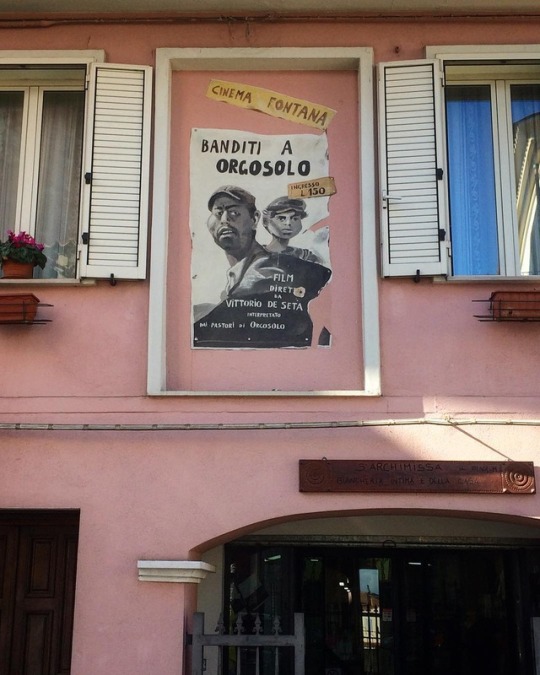
The Orgosolo mural. «Bandits of Orgosolo»• Murales di Orgosolo. Banditi a Orgosolo» • Мурали Орґозоло. «Бандити Оргозоло» ••• #world #italia #italy #sardegna #sardinia #orgosolo #streetart #murale #murales #color #amazing #travel #spring #nofilter #гарно #стрітарт #мурали #колір #подорожі #весна #оргозоло #сардинія #італія #світ #безфільтрів (Orgosolo) https://www.instagram.com/adamnet21/p/BwWDr0FH5zB/?utm_source=ig_tumblr_share&igshid=1lkuysqkk6spl
#world#italia#italy#sardegna#sardinia#orgosolo#streetart#murale#murales#color#amazing#travel#spring#nofilter#гарно#стрітарт#мурали#кол��р#подорожі#весна#оргозоло#сардинія#італія#світ#безфільтрів
1 note
·
View note
Video
youtube
Film by Vittorio De Seta, Banditi a Orgosolo (1961)
Inspired by the isolation of Orgosolo, where outlaws and bandits would hide. Local shepards were cast in some of the lead roles.
0 notes